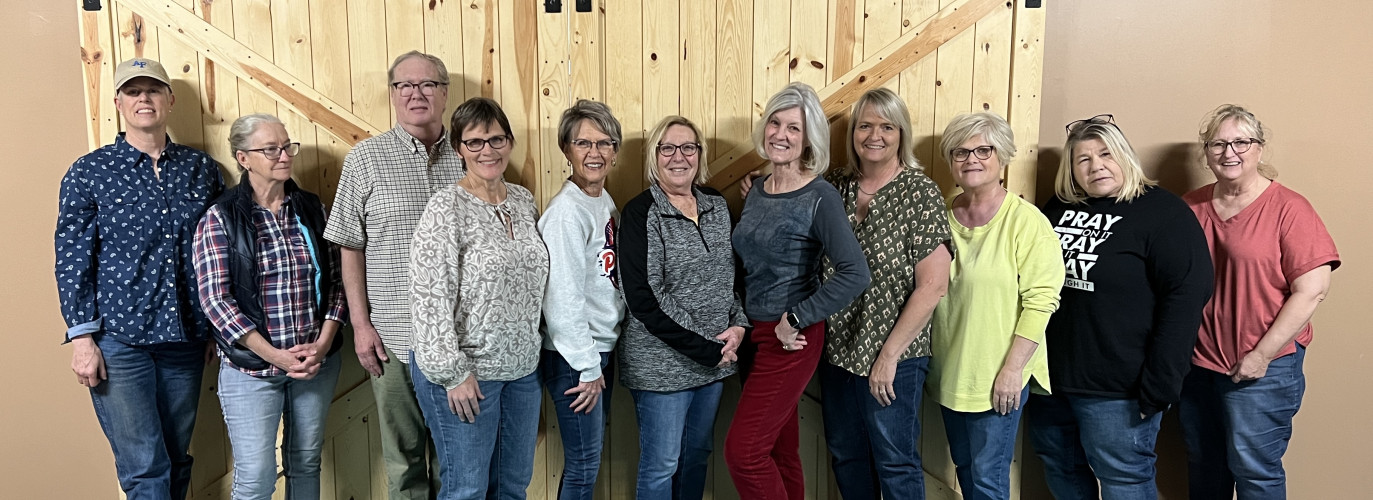Mar 07, 2024

By Rick McNary
“Our communities need us to dream for them.”
-Marcia Taylor-Trump
As I traveled to Howard down the undulating two-lane road sandwiched by sienna-colored prairie grasses of the Flint Hills, I reminisced about previous trips there. In my high school football days, I bounced along these same roads in big yellow buses from Rosalia when our Flint Hills Mustangs endured repeated beat-downs by the West Elk Patriots on the football field in Howard. My dad referred to their victories over us as shellackings.
Later, as a parent, I followed my children in similar big yellow buses to their sporting events.
Howard sits in a breathtaking and unusual geographic transition from the southern tip of the vast rolling prairies of the Flint Hills as it segues into the Chautauqua Hills and the northern part of an ecosystem known as Cross Timbers. In his travels to the western frontier in the early 1830s, American writer
Washington Irving characterized the Cross Timbers as “forests of cast iron.” The Cross Timbers, or Cast-Iron Forest, was a swath of blackjack and post oak trees that ran all the way south near Dallas. Early pioneers coming from the east found the Cross Timbers virtually impenetrable through the undergrowth and small, thick trees. A nearby Cross Timbers State Park has marked trails that wind through a forest with trees as old as President George Washington.
It had been nearly 20 years since I last shivered in the stadium in Howard watching my children at a brutally cold spring track meet where the howling north wind almost stopped hurdlers midstride. As each mile I traveled turned over one fond memory after another, I wondered what I would see upon arrival.
Would it be like so many small towns that are slowly dying on the prairie as the last vestiges of hope depart when the senior class graduates? Would the iconic Toots Drive-In still dish out deliciousness? Would other businesses have replaced their windows with plywood and glaring No Trespassing signs?
A July 2023 report in the Wichita Eagle listed Elk County as the second poorest county in the state with a median income of $45,660, median home value of $72,455 and the highest poverty level of any county in the state at 16.2 percent. Would I find Howard a dying town in one of the most beautiful parts of the state
Nope. Not even close.
Instead of finding the town barely surviving, I found it alive and thriving. Toots Drive-In is still there along with several new businesses, evidence of the vibrancy of a vivacious populace.
I soon found the origin of inspiration for this small-town vibrancy in the banquet room of the restaurant, Sweet and Spicy. There, gathered around tables, were the energetic members of the Elk County Community Foundation (ECCF). Along with a delicious meal, I was served generous helpings of laughter, inspiration, hope and, once they found out I was a Flint Hills High School grad, a bit of good-natured ribbing. It felt like home.
I was delighted when I received notice from the Central Kansas Community Foundation (CKCF) that, as a board member, I had been selected to be the affiliate liaison to the ECCF. I called up their chair, Marcia Taylor-Trump, and she invited me to their noon meeting.
Their stellar reputation in the foundation world had already caught my attention because, as a CKCF board member on the appreciation committee, I had recently sent numerous handwritten thank you notes to donors in Elk County when they raised $97,000 for the Patterson Family Foundation (PFF) Matching Grant.
Neal Patterson was a native of rural Kansas having grown up near Anthony. He and his wife, Jeanne, were principals in Cerner Health and began investing philanthropically into rural communities in Kansas and Northwest Missouri through the PFF. After their passing, their children took over the helm and strived to help lift rural communities through health care, education, economic opportunity and beyond. One of their most successful initiatives was the $70,000 matching grant for rural community foundations of which ECCF has taken full advantage.
In a county with a population of only 2,441 souls, the ECCF made short work of not only raising the initial $70,000 but an additional $27,000 for a grand total of $97,000, which then turned into $167,000. Elk County tackled the PFF Matching Grant Challenge with the same intensity they used to tackle me in football games. All that money was then distributed to various nonprofits in the six communities that ECCF represents.
As I sat at the table listening to the banter of lively conversation as Marcia worked through the agenda, I was reminded of the power of community foundations, these grantmaking public charities dedicated to improving the lives of people in their communities. They turn seeming impossibilities into vibrant possibilities.
However, like any group, they are only as effective as the people who comprise the group. As I listened in that day, I understood this collection of dreamers and doers were the changemakers in Elk County. This was not a group who sat around just talking about dreams, instead, this was a group who learned how to both dream and do. Their energy was infectious and reminded me of Margaret Meads quote, “Never doubt that a small group of thoughtful, committed citizens can change the world; indeed, it’s the only thing that ever has.”
In her closing remarks, Marcia made one of the most compelling challenges for civic leadership I have ever heard: “We need to dream,” she said. “But more importantly, our communities need us to dream for them.”
The communities of Elk County are fortunate to have passionate citizens like the ECCF board dreaming on their behalf. And based on my past personal experiences on their football field, they will continue tackling the challenges with dedication, skill and intensity. And they will be victorious.
